THE WORLD GOES ON by Laszlo Krasznahorkai, translated from the Hungarian by John Batki, Ottilie Mulzet, and Georges Szirtes, is a collection of short stories, and probably the most accessible of Krasznahorkai’s works. My favourite Amazon review of this book is as follows:
Long, drawn out, and difficult to read. Mistake to propose for book club
I love that.
We are in the midst of a cynical self-reckoning as the not-too-illustrious children of a not-too-illustrious epoch that will consider itself truly fulfilled only when every individual writhing in it—after languishing in one of the deepest shadows of human history—will finally attain the sad and temporarily self-evident goal: oblivion.
Old Laszlo is not the cheeriest of souls. He has co-written two of the best films of the century: WERCKMEISTER HARMONIES and THE TURIN HORSE. He is, in fact, difficult to read, because he’s one of that school of writers who will write a sentence that’s twenty pages long. There’s less of that in THE WORLD GOES ON, because he’s writing short stories and has a point to get to, where his novels tend to be long journeys where the voyage has more value than the destination.
Let me be clear, though: I would stand the first section of his BARON WENCKHEIM’S HOMECOMING, with the mad hermit in the woods living inside a house made entirely of polystyrene packing material, against anything written in the last fifty years. I don’t know why he doesn’t have a Nobel Prize, but, then again, they didn’t give one to Borges either.
…an infinite melancholy seized my soul . . .what shall I compare it to, it was like honey—you know, the kind where a spoonful is enough to kill anyone.
There is Borges in him, and Beckett. A section of THE WORLD GOES ON is dedicated to Beckett, and there’s an echo of Beckett in the title itself – “You must go on. I can’t go on. I’ll go on.” – but that section, and much of his other work, also has the murk of Kafka to it. The man himself once said:
“When I am not reading Kafka I am thinking about Kafka. When I am not thinking about Kafka I miss thinking about him. Having missed thinking about him for a while, I take him out and read him again. That’s how it works.”
Anyway. Twenty one short stories framed by statements of a narrator. Each one, at its root, a modern fable. Each one a darkly surreal sketch of an emotion (or a tangle of conflicting emotions), a philosophical premise, a human conundrum, a story of life out on its blurry forbidden edge zones.
…for us works of art no longer contain narrative or time, nor can we claim that others might ever be able to find a way toward making sense of things.
Consider it an introduction to a very particular, very peculiar view of life, the universe and everything, beamed out from a hideaway in the Hungarian hills by a mad scientist of literature. All told with a grim smile and tools he invented in his own secret lab.
Krasznahorkai is a furious thinker, and every piece of his work is a journey of discovery. Sometimes it’s hard, sometimes you just flow with it, but it’s always worth it. If you’re ready for a hard book by a giant of literature who thinks differently, this winter, start here.
THE WORLD GOES ON, Laszlo Krasznahorkai

